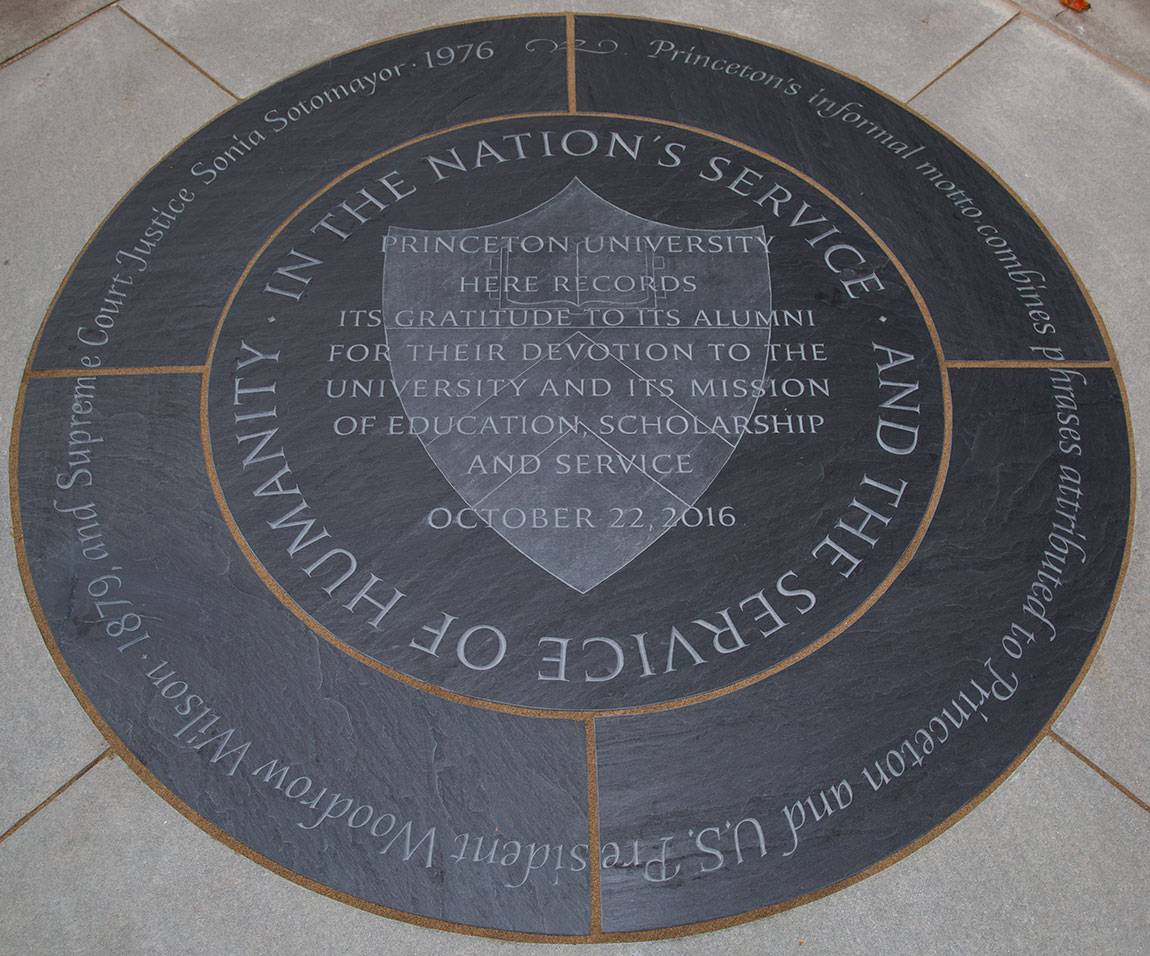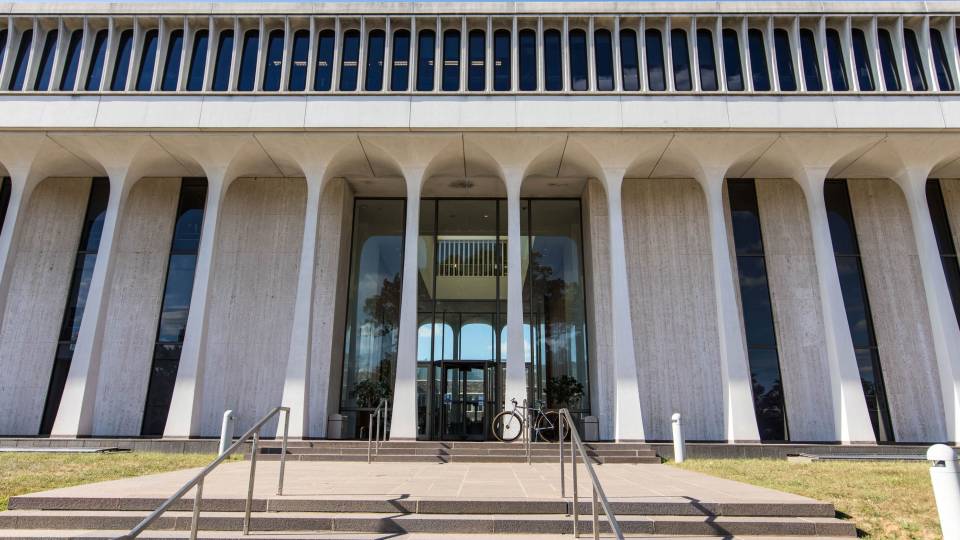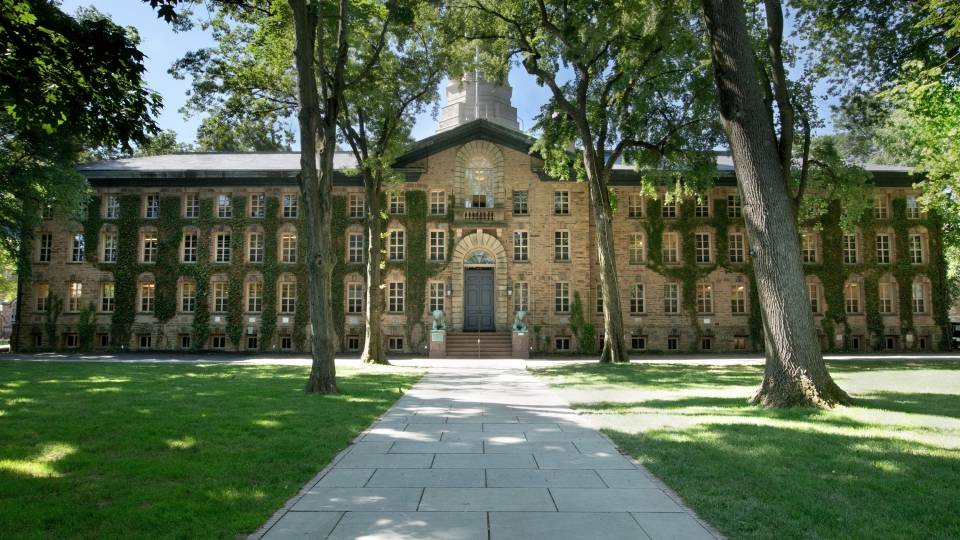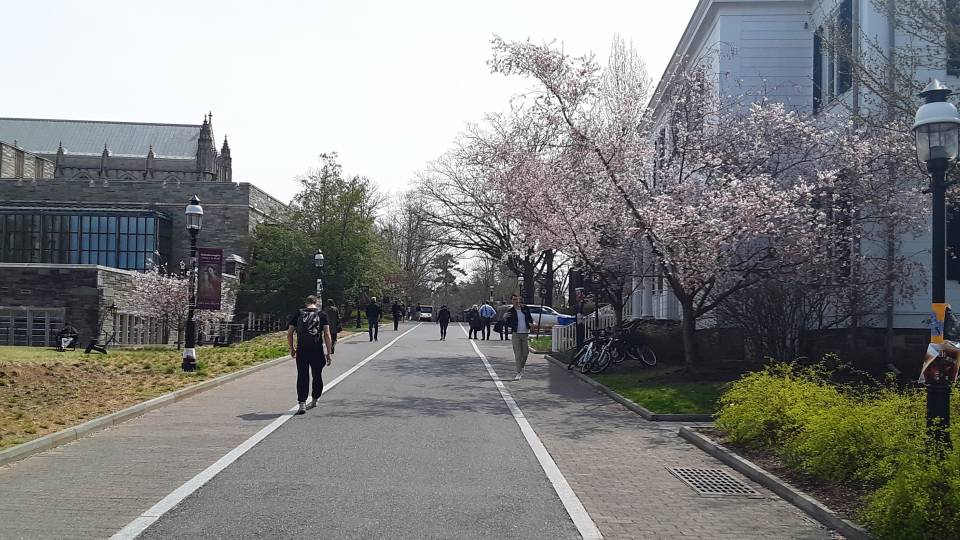With cheers and applause, members of the University community celebrated the unveiling of Princeton’s revised informal motto at a ceremony on Saturday, Oct. 22. “In the Nation’s Service and the Service of Humanity” read the words carved in the stone medallion set in the crossroads of the walkways on the front lawn of Nassau Hall — a new historic marker for a University that is continually evolving.
The dedication was held on Charter Day, the 270th anniversary of the signing of Princeton’s charter on Oct. 22, 1746. Many of the attendees were Princetonians on campus for Alumni Volunteer Weekend, which had “in service of Princeton and humanity” as this year’s organizing theme.
Due to the rainy weather, the medallion was unveiled twice — first as a photo in Chancellor Green Rotunda where the speeches were given and then around its actual setting in front of Nassau Hall — by Jeffrey Wieser of the Class of 1974 and Sara Judge of the Class of 1982, president and vice president of the Alumni Association(Link is external), respectively.
Princeton President Christopher L. Eisgruber, Class of 1983, said recasting the informal motto was a chance to “participate once again in the vibrant evolution of the traditions that shape this University’s identity.”
The traditions, he said, are “living things,” like those of the country and the Constitution, referring to a quotation by Justice John Marshall Harlan of Princeton’s Class of 1920. “We do them no justice if we regard them as relics deserving of uncritical adulation, mindless obeisance, or ossified preservation,” Eisgruber said. “We give those traditions their due — we honor them most faithfully — only if we cultivate them actively in light of the values and purposes at the heart of this great liberal arts University.”

Alumni Jeffrey Wieser, Class of 1974, and Sara Judge, Class of 1982, uncover the new medallion on the front lawn courtyard of Nassau Hall. The ceremony included remarks by, from left, Bob Durkee, vice president and secretary and a member the Class of 1969; Brent Henry, also of the Class of 1969 and chair of the special trustee committee that examined the legacy of Woodrow Wilson at the University; and Princeton President Christopher L. Eisgruber, Class of 1983. Many of the attendees were alumni on campus for Alumni Volunteer Weekend.
The new medallion’s inscription explicitly states that the new motto bridges phrases from Woodrow Wilson, Class of 1879, who served as president of Princeton before becoming president of the United States, and Supreme Court Justice Sonia Sotomayor, Class of 1976. The medallion also expresses gratitude to alumni for their devotion to Princeton, in words etched into the University shield.
In 1996, as part of the University’s 250th anniversary, Wilson’s phrase “Princeton in the Nation’s Service” was expanded with “and in the Service of All Nations,” to reflect Princeton’s growing international presence. Those words came from the 18th president of Princeton, Harold T. Shapiro, a 1964 graduate alumnus, and were carved in a medallion set in the same place on the front lawn courtyard.

At Alumni Day in 2014, upon receiving the Woodrow Wilson Award, Sotomayor credited the University with instilling a commitment to service within her, and suggested broadening Princeton’s informal motto to include not just the nation’s service but “the service of humanity.” Her words subsequently were combined with Wilson’s and etched in the stone medallion installed on the front lawn of Nassau Hall.
Eisgruber spoke of the University’s evolution: “We began as a tiny liberal arts college founded to educate young men for the Presbyterian ministry. In Wilson’s era we became a research university. In Sotomayor’s time, we opened our gates to a wider world, becoming at once more diverse, more international and more intellectually eminent than ever before.”
He described how Sotomayor, upon receiving the Woodrow Wilson Award at Alumni Day in 2014, suggested expanding the informal motto to include service to “all members of the human community.”
Opening the event, Bob Durkee, vice president and secretary and a member of the Class of 1969, recounted that last spring, the Board of Trustees approved a series of recommendations(Link is external) put forward by a special trustee committee to consider the legacy of Wilson at Princeton as part of a broad range of initiatives to “reaffirm and enhance this University’s commitment to diversity and inclusivity.” One of the recommendations was to update the informal motto.
In his remarks at the ceremony, the chair of that committee, Brent Henry, a member of the Class of 1969 and vice chair of the Board of Trustees, said that in the process of hearing from the “Princeton family,” the committee “recognized that a recast medallion would allow us to express both the time-honored aspiration stated by Woodrow Wilson and the forward-looking aspiration stated by Sonia Sotomayor.”
Noting that on Alumni Day Sotomayor, who also has served as a Princeton trustee, emphasized forms of service including “humble acts of human kindness that improve the lives of others,” Henry said he hoped “all of us take inspiration from this new motto to make service an integral part of our lives, so that each of us, in our own ways, can in fact be of service to humanity and help make the world a better place.”

In his remarks, Eisgruber said recasting the informal motto was a chance to “participate once again in the vibrant evolution of the traditions that shape this University’s identity.”
In closing, Eisgruber said: “This modest ceremony may soon be forgotten. But so long as this medallion remains in this courtyard in front of Nassau Hall, in this meaningful and beloved place, it will remind students, faculty, staff, alumni and visitors to campus of this University’s values. It will remind them of those who helped to build the institution we cherish, and it will remind them, too, of our collective responsibility simultaneously to respect the past, to acknowledge forthrightly its deficiencies, and to improve upon it.”
Alumnus Ed Masinter of the Class of 1952 said before the unveiling in Chancellor Green that he was “comfortable with the reasoning” behind the modified informal motto, especially after spending Friday participating in various discussions as part of Alumni Volunteer Weekend. He added that he was “concerned that we not lose sight of service to the nation while emphasizing the very important point of service to humanity.”
At the medallion’s unveiling in front of Nassau Hall, Vitus Lau, Class of 1979, said he thought the revised statement was “wonderful.” Lau, who was on campus from the San Francisco Bay Area for “the duration” of the volunteer weekend, said: “It captures the latest narrative of world affairs. We are not just nations separated by borders … we may even be nationless … service to humanity is apt.”

Due to rainy weather, the medallion was first unveiled as a photo in Chancellor Green. Shown from left are Durkee, Eisgruber, Wieser, Judge and Henry.
About the medallion
Dan Casey, coordinating architect in the Office of the University Architect, outlined key features of the new medallion:
— It is made from Buckingham black slate from Virginia.
— The inscription was carved by hand by Nicholas Benson of the John Stevens Shop, a family business in Newport, Rhode Island. Benson, a third-generation carver in his family, received a MacArthur Fellowship for his craft in 2010.
— It is made up of five pieces that together weigh about 800 pounds.
— The design and its setting was a collaboration between Benson and the Office of the University Architect.
— The medallion was laid by the Facilities civil engineering team in a way similar to the setting of the large paving stones in the walkways on campus — “over layers of compacted crushed stone and bituminous concrete, then set in a dry mortar mix of sand and cement,” Casey said.

The medallion, laid by the Facilities civil engineering team, is made up of five pieces that together weigh about 800 pounds.











